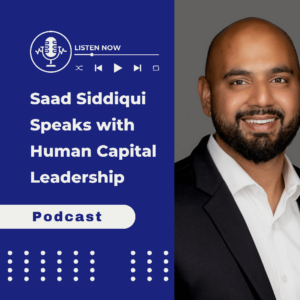TV’s General Partner, Saad Siddiqui, discusses how technology is fundamentally changing the role of HR professionals and how they onboard, train, handle employees’ sensitive data, etc. Below are key excerpts from the podcast.
Start of the Need for Tech in HR
In COVID, HR Teams had to navigate everyone being full of remote and like building out systems and processes to help manage remote work, then massive acceleration of hiring. Like we have, we’ve never seen hiring at the pace that we did during COVID, and then to massive force reductions and things like that, where there’s a lot more emphasis around productivity and efficiency. So HR teams are trying to navigate all of this in a very short time and kind of building processes on the fly. And the way I sort of think about it is that technology can be an accelerant to your strategy. But it is very important to understand what your strategy is before you start implementing a lot of these technology solutions.
Everything in HR is Changing Quickly
So, in our mind, the way we identify employees is changing, the way we onboard employees is changing, the way we manage employees is changing, how we kind of monitor their success, how we sort of build out their KPIs is changing. And then as folks transition from the organization, that whole process is changing. There’s a lot more emphasis around making sure your hiring practices account for books that are of diverse backgrounds. So there’s a lot of these unique things that are sort of happening at the same time and have accelerated over the last couple of years. So those are the major things that we’re starting to think about, trends that we’re definitely paying attention to.
And, I think with the advent of generative AI, HR teams are definitely trying to get a handle on that along with its departments where people are putting a lot of sensitive data in the hands of systems that they prefer not to have company data and stuff. There’s just a tremendous amount of change that’s happening in a very short time.
AI and Remote Work
Because we’re in a world where we’re dealing with large language models and AI, where innovation is accelerating, people are starting to see companies that have all folks back in the office are innovating faster, they’re out competing. The folks that are sort of more remote centric, they’re just not collaborating in a way that they used to.
November of 2022 is when ChatGPT was launched. So about 10 months ago and in that time, we’ve seen this massive productivity gain across the enterprise. We’re seeing a tremendous amount of content being generated. Marketing teams are getting inside in a massive way where they’re building on campaigns, they’re sending out emails initially on an augmented basis and now fully automated as the models keep improving. And then we’re seeing it on the engineering side where there’s something like 1/15 of all the code that’s generated in the world today is actually generative AI code. We suspect that that’s gonna get to 80-90% of all code generated is gonna be generative AI code.
AI in Learning and Development, Sales and Marketing, Customer Service, Health Care and Education
So I think that’s an example of learning and development and primarily in the sales and marketing use case. But we’re starting to see that across everything, right? So we’re starting to see that in customer service. A lot of customer service roles are being automated using gene AI and people are getting their questions answered significantly faster than they did in the past where they had to wait on the phone for hours on end.
And this sort of like, basically helps you get answers as quickly as possible. So I think this is gonna start becoming much more prevalent. There’s going to be some really interesting adoption over the next couple of years of AI, although one thing I am aware of is security around this is very critical. You just need a new company to have a private data leak and like everyone’s gonna start freaking out. So making sure that you’ve got proper security controls around China AI is really critical for, for enterprises.
There’s a couple of other areas that we’re also spending a bit of time on around health care benefits. We’re also spending some time on actually interesting enough background checks and how our that industry is and how that industry is starting to also get modernized with advanced machine learning and things of that nature.
There’s so many ways that we can start to apply these things and think about that from a a learning and development perspective or a or a leadership development and mentoring perspective within organizations. Think about trying to train up the next level of leaders in the pipeline for your organization and the time and energy it takes to be able to do effective mentoring programs, think how we can utilize some of these types of tools to help us do that in real time and do it more effectively, the sky’s the limit.

